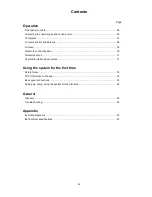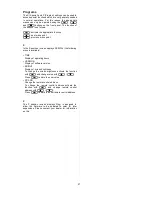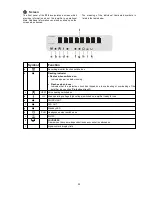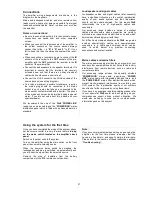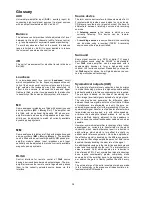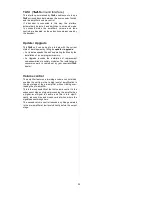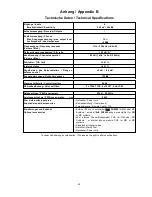
Connections
The amplifier wiring arrangements are shown in the
diagrams in the Appendix.
Mains and loudspeaker cables, and also remote control
leads must be kept as far away as possible from signal
leads and antenna cables. Never run them over or under
the amplifier.
Notes on connections:
•
Be sure to push all plugs firmly into their sockets. Loose
connections can cause hum and other unwanted
noises.
•
When you connect the input sockets of the amplifier to
the output sockets on the source devices always
connect like to like, i. e.
'R'
to
'R'
and
'L'
to
'L'
. If you
fail to heed this then the stereo channels will be rever-
sed.
•
When connecting a recorder be sure to connect the
IN
sockets of the recorder to the
OUT
sockets of the pre-
amplifier, and the
OUT
sockets of the recorder to the
IN
sockets of the pre-amplifier.
•
Connect the loudspeakers to the speaker terminals. It is
important to ensure that the terminals are securely
screwed down, and that there are no stray strands of
cable which could cause a short-circuit.
•
Connect the R
LINK
socket to the R
LINK
sockets of the
source devices (see wiring diagram).
•
To achieve maximum possible interference rejection
the mains plug should be connected to the mains
socket in such a way that phase is connected to the
mains socket contact marked with a dot (
). The phase
of the mains socket can be determined using a special
meter. If you are not sure about this, please ask your
specialist dealer.
We recommend the use of the
'POWER LINE'
ready-to-use mains cable and the
'POWER BAR'
mains
distribution panel which is fitted with a phase indicator as
standard.
Loudspeaker and signal cables
Loudspeaker cables and signal cables (inter-connects)
have a significant influence on the overall reproduction
quality of your sound system, and their importance
should not be under-estimated. For this reason
recommends the use of high-quality cables and
connectors.
Our accessory range includes a series of excellent
cables and connectors whose properties are carefully
matched to our speakers and electronic units, and which
harmonise outstandingly well with them.
For difficult and cramped situations the
range also
includes special-length cables and special-purpose
connectors (e. g. right-angled versions) which can be
used to solve almost any problem concerning
connections and system location.
Mains cables and mains filters
The mains power supply provides the energy which your
sound system equipment needs, but it also tends to carry
interference from remote devices such as radio and
computer systems.
Our accessory range includes the specially shielded
'POWER FOUR'
mains cable, ready-to-use
'POWER
LINE'
mains cable with integrated shell-type filters and
the
'POWER BAR'
mains filter distribution board which
prevent electro-magnetic interference from entering your
Hi-Fi system. The reproduction quality of our systems
can often be further improved by using these items.
If you have any questions regarding cabling please refer
to your specialist
dealer who will gladly give you
comprehensive expert advice without obligation. We
would also be happy to send you our comprehensive
information pack on this subject.
Using the system for the first time
Once you have completed the wiring of the system, please
set the volume control to a very low level before
turning
on the mains switch located on the amplifier’s back
panel
.
Switch on the other units in the system.
Turn on the amplifier using the main switch on the front
panel, then select a listening source.
When the power-on delay period has elapsed, the
loudspeaker outputs are switched on automatically and
you will hear the signal from the selected source.
Remove the strip of insulation from the battery
compartment of the
F10
remote control handset.
Note:
If you encounter problems when setting up and using the
amplifier for the first time please remember that the
cause is often simple, and equally simple to eliminate.
Please refer to the section of these instructions entitled
'
Trouble shooting
'
.
37
Summary of Contents for P 10
Page 1: ...V 1 0 Bestellnr Order No 9103 0352 B BETRIEBSANLEITUNG USER MANUAL P 10...
Page 2: ...2...
Page 22: ...22...
Page 23: ...English 23...
Page 44: ...B elektroakustik GmbH Co KG Herford Deutschland Germany...



